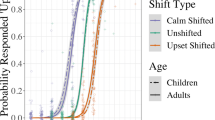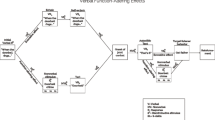Abstract
In a classical conditioning paradigm, Ss were presented with a series either of nonsense syllables or national names (CS). Each syllable or name was paired with words having positive, negative, or neutral affective meaning (USC). Ss who were aware of the UCS-CS relationship showed more conditioning of meaning, better recall of the stimuli, and greater responsiveness to stimulus variables. Meaningless CS’s were more effective. It was concluded that no single variable determines the degree of conditioning.
Similar content being viewed by others
References
COHEN, B. H. 1964. Role of awareness in meaning established by classical conditioning. Journal of Experimental Psychology, 67, 373–378.
DeNIKE, L. D. 1964. The temporal relationship between awareness and performance in verbal conditioning. Journal of Experimental Psychology, 68, 521–529.
GERSTEIN, A. I. 1961. The effect of reinforcement schedules on meaning generalization and on awareness of the purpose of the experiment. Journal of Personality, 29, 350–362.
INSKO, C. A. & OAKES, W. F. 1967. Awareness and the “contioning” of attitudes. Journal of Personality and Social Psychology, 4, 487–596.
MURPHY, R., SMITH, S., & MYERS, T. I. 1963. The effects of sensory deprivation and social isolation on the conditioning of connotative meaning. Paper presented at the meeting of the Amer. Psychol. Assoc.
OSGOOD, C. W. & TANNENBAUM, P. H. 1955. The principle of congruity in the prediction of attitude change. Psychological Review, 62, 42–55.
ROZELLE, R. M. 1968. Meaning established by classical conditioning: failure to replicate. Psychological Reports, 22, 889–895.
STAATS, CAROLYN K. & STAATS, A. W. 1957. Meaning established by classical conditioning. Journal of Experimental Psychology, 54, 74–79.
STAATS, A. W. & STAATS, CAROLYN K. 1958. Attitudes established by classical conditioning. Journal of Abnormal and Social Psychology, 57, 37–40.
Author information
Authors and Affiliations
Additional information
Financial support for this research was received from the Rutgers University Research Council.
Rights and permissions
About this article
Cite this article
Freeman, N.C.G., Suedfeld, P. Classical Conditioning of Verbal Meaning: The Roles of Awareness, Meaningfulness, and Evaluative Loading. Psychol Rec 19, 335–338 (1969). https://doi.org/10.1007/BF03393857
Published:
Issue Date:
DOI: https://doi.org/10.1007/BF03393857




